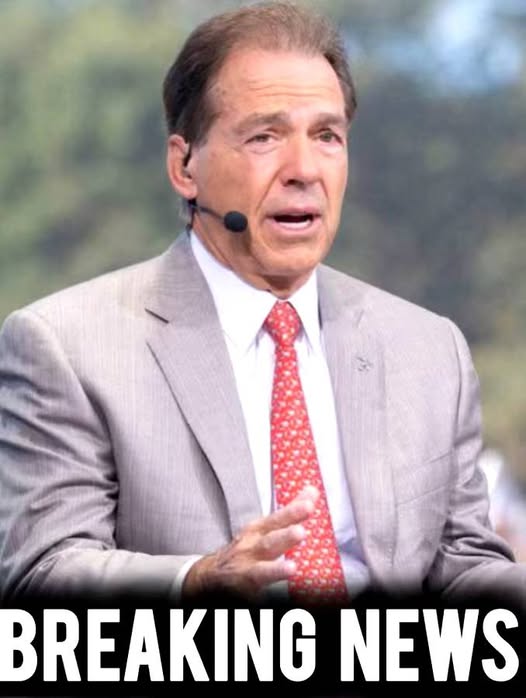In a stunning and unprecedented move that could redefine the relationship between college athletics and personal development, legendary former Alabama Crimson Tide head coach Nick Saban has unveiled a pioneering initiative aimed at mentoring current and future Alabama players. Though officially retired from coaching as of early 2024, Saban’s enduring influence in Tuscaloosa continues to shape the culture, expectations, and support system around Crimson Tide football.
The initiative, formally titled “The Legacy Bridge: Mentorship for Life Beyond the Game”, is not only a passion project for Saban but also a direct response to the increasing challenges faced by student-athletes in today’s evolving collegiate landscape. The program brings together Alabama football alumni, business leaders, mental health professionals, and academic experts in a carefully designed network of support and career preparation for players navigating both their time at the university and their lives after football.
A Vision Beyond the Gridiron
“Football is a game, but life is the real challenge,” Saban said during a press conference on campus in Bryant-Denny Stadium, where he was greeted with a standing ovation. “For decades, I coached young men to win championships. Now, I want to help them win at life. This program is about building character, not just careers.”
According to Saban, “The Legacy Bridge” was conceived during his final season as Alabama’s head coach. After observing an alarming rise in mental health struggles, financial instability among former players, and the ever-changing pressures brought on by NIL (Name, Image, Likeness) agreements, Saban recognized that his role as a mentor had evolved beyond game planning and recruiting.
“Some of the kids I coached are now CEOs, fathers, and community leaders,” Saban added. “But others found themselves lost after football ended. That never sat right with me.”
The Structure of the Program
“The Legacy Bridge” will be integrated into Alabama’s athletic department in partnership with the university’s business school, counseling services, and external foundations, including The Saban Family Foundation and The Crimson Tide Forever Initiative.
Key Features:
- Mentorship Pods: Each current Alabama football player will be assigned to a small group “pod” consisting of at least one former Crimson Tide player, one professional mentor in their field of interest (sports, business, media, etc.), and a wellness coach. These pods will meet monthly and offer guidance, support, and planning for life beyond football.
- Career Acceleration Workshops: Every offseason, players will attend workshops that focus on resume building, financial literacy, entrepreneurship, public speaking, and even lessons on taxes and investments — a crucial skill set in today’s NIL-rich environment.
- “Real Talk” Mental Health Forums: Recognizing the mental strain that comes with high-level athletics, Saban has ensured mental health is central to the program. These forums will feature open discussions led by sports psychologists, former players who’ve faced adversity, and wellness advocates.
- Internship Pipeline: The program has already partnered with over 40 companies across various industries — from Nike and Goldman Sachs to Tesla and ESPN — to provide off-season internships to eligible juniors and seniors.
- Annual “Legacy Summit”: Set to be hosted every spring, this event will bring together alumni, current players, and thought leaders in sports and business to network, collaborate, and inspire. Saban will personally moderate the keynote address each year.
Support from the Alabama Community
The response from the Alabama football family has been overwhelming.
Former Alabama quarterback and current Philadelphia Eagles starter Jalen Hurts, who is already committed to being a mentor in the program, praised Saban’s vision: “Coach Saban helped me develop as a leader. Now, I want to give back to the next generation of Bama men. This is bigger than football — this is about building legacies.”
Julio Jones, a Bama legend and recently retired NFL wide receiver, echoed that sentiment. “This is the kind of structure I wish I had when I was younger. Having someone to talk to about life decisions, business ventures, or even relationships would’ve made a world of difference. Leave it to Coach Saban to be thinking three steps ahead even in retirement.”
Saban’s Lasting Influence
Since stepping down from coaching, Saban has embraced his role as an ambassador for the sport and an advocate for player development. Though he has not publicly indicated interest in returning to coaching in any capacity, his involvement in player mentorship suggests a second chapter just as impactful as his legendary career on the sidelines.
Under his leadership, Alabama won six national championships, helped dozens of players reach the NFL, and set a standard for excellence in college football. But in many ways, “The Legacy Bridge” could become his most meaningful contribution to the sport.
“This is his new dynasty,” said current Alabama head coach Kalen DeBoer, who worked closely with Saban on the launch of the initiative. “We talk a lot about building champions. What Coach Saban is doing now — helping young men succeed in life, mentally, emotionally, financially — that’s real championship-level work.”
Funding and Sustainability
The program will be largely funded through the Nick and Terry Saban Legacy Endowment, which has received more than $25 million in donations in its first six months. Several Alabama boosters, including billionaire investor and longtime supporter Harold “Red” Branson, have pledged ongoing support.
“Terry and I have always believed in giving back,” Saban said. “This endowment is about ensuring this program doesn’t just run for a few years. We want it to last for generations.”
The university has also committed to matching a portion of the endowment annually through its athletic and academic development budgets, signaling a deep institutional investment in the initiative.
The NCAA and Other Programs Take Notice
The national response has been swift. Several other Power Five programs — including Georgia, Ohio State, Clemson, and USC — have reached out to Alabama for insight on potentially launching similar models. The NCAA itself has taken note, with President Charlie Baker calling Saban’s effort “a gold standard for holistic athlete development.”
“In a time when college athletics is facing unprecedented change and scrutiny, this kind of initiative sets a moral and developmental compass for the rest of us,” Baker said.
Players Already Seeing the Impact
Sophomore linebacker Tyreek Winters, who is majoring in finance, says the program has already helped him refine his post-football goals.
“I came to Alabama to win a championship and make the league,” Winters said. “But now I’m thinking about starting my own investment firm one day. Coach Saban introduced me to a mentor who owns a private equity company in Atlanta, and we talk every week. It’s changed how I view success.”
Junior wide receiver Kendall Hayes said the “Real Talk” forums have helped him face anxiety and expectations.
“Sometimes it’s hard to admit you’re struggling when you’re expected to be strong all the time,” Hayes admitted. “Knowing that Coach Saban still cares about us, even though he’s not on the field anymore, means everything.”
Saban’s Message to Other Coaches
In his closing remarks at the press conference, Saban issued a challenge to other coaches around the country.
“Winning football games is great. But if you really want to leave a legacy, invest in your players as people. Be there for them after the final whistle blows. That’s what really matters.”
He continued, “We’ve taught them to compete. Now we need to teach them how to live.”
Looking Ahead
As the first wave of players enters the program, expectations are high — but so is optimism. Alabama’s football culture has long been defined by its relentless pursuit of excellence on the field. Now, with Saban’s new mentoring initiative, that excellence is expanding into every facet of a player’s life.
And perhaps, years from now, when future Alabama stars reflect on their time in Tuscaloosa, it won’t just be about rings, touchdowns, or NFL contracts. It might just be about a conversation, a mentor, or a piece of advice that helped them navigate life after the game — all thanks to Coach Saban, a man who refused to stop coaching when the game ended.



